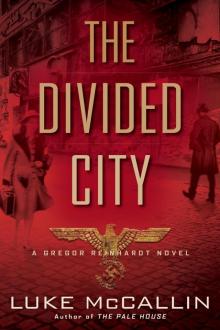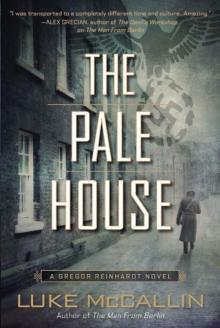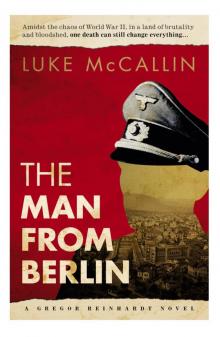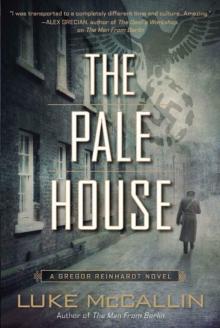- Home
- Luke McCallin
The Pale House Page 13
The Pale House Read online
Page 13
“Nothing?”
“Just putting away tools. That kind of thing.”
“You saw nothing and no one?” Reinhardt said, a little smile on his face, inviting Metzler to play the game.
“Nothing, sir,” the lieutenant said, relaxing, those heavy fists of his uncurling slightly.
“What time does the sun come up?”
“About . . . six thirty.”
“Six thirty. And it’s dark before then.”
“Yes, sir.”
“Nothing to see. Nothing to be done.”
“Not unless you want to go stumbling around in the dark,” said Metzler, allowing a little levity into his voice.
“So what was Lieutenant Brandt doing there with fifty men at four thirty in the morning?” Light had begun flushing the dark from the eastern sky, graying upward from the mounded horizon, at around six o’clock as Reinhardt was finishing up at the construction site, and the sun was fully up around thirty minutes later. The lieutenant’s mouth moved, and then he swallowed, and his fists bunched tight again. Reinhardt said nothing, letting Metzler work out the implications of what he had just admitted.
“I don’t . . .”
“What might you have been doing at that time up there?” asked Reinhardt, tightening the screws a little.
“I don’t . . .”
“Just think. Give me an idea,” said Reinhardt, poking, prodding. “Anything.”
“I’m sure I would have had a reason, sir,” said Metzler, his eyes blanking out, and the whole of him tightening back up as if drawn tight by a thread.
“Amaze me, Lieutenant.”
“I think you’d have to ask Lieutenant Brandt that, sir.”
“And where do I find him?”
“I don’t know, sir.”
“Who might know?”
“Major Jansky, sir.”
Full circle.
Reinhardt dismissed Metzler, telling him to find Major Jansky for him. He wondered he was not more frustrated than he was with this kind of obtuseness from men like Metzler, and wondered if it had anything to do with his being a Feldjaeger and had an expectation that he would be obeyed. He examined that thought a moment but decided to put it aside for later. He could ill afford his habitual introspection now.
He watched Metzler hurry across the muddy expanse of the inner courtyard. Old stone buildings stood here and there hard against the walls, the stables and barracks of the Ottoman troops who had once garrisoned this place, and mixed in with them or extending from them, more recent structures of brick and timber and canvas. Smoke drifted up from some of them, and a hammer rang somewhere. Over in the far corner, past where Metzler had gone, stood a row of trucks, men working around one of them, waist-deep in the engine compartment. A sergeant bawled at a group of men who were doing punishment drills along one of the walls, kneeling, crawling, running, falling face-first, rising again to the discordant rhythm of his orders. Not far from that, a group of men in mismatched uniforms holding shovels and picks was marshaled under the harsh bellows of a pair of Feldgendarmes, then loaded onto a truck, aided by kicks and blows from rifle butts. Reinhardt watched the truck rock past and out under the fortress’s entrance.
Next to the command post was a stone building with a heavy wooden door. Moving without thinking, he pushed it open, stepping down into a long, low, darkened space, and immediately knew it for a barracks. Wooden bunks rose to the left and right, and the air was tight with the closed-in fug of sleeping men. There was a low susurration, slow and heavy like the tide, the breathing of exhausted men. A soldier by the door, woken by the light and cold, blinked open fuddled eyes, saw Reinhardt, and pulled himself out of his bed. The man’s uniform was filthy, the bottoms of his trousers and the cuffs of his shirt caked in mud, and his eyes were sunk far back beneath the spare line of his brow.
“As you were,” Reinhardt said, quietly. The man made no protest, just folded himself back into his bunk as Reinhardt backed outside, closing the door quietly, then followed the smells to the mess tent. It was largely empty inside, only one or two soldiers sitting at long, wooden benches and crates of iron rations—the army’s emergency supplies—standing open along the wall of the tent. A cook was breaking the hard, all-but-tasteless black bread from the ration packs into a vat of soup. In the cauldron the water foamed and roiled, pulling Reinhardt’s gaze, and a waxen shape appeared. A skull with a caprine eye stared gravely through ribboned flesh. It turned and sank away, bobbing up again as though eager for a last glimpse of this world. Reinhardt watched fixedly as the cook ladled soup into a man’s bowl, then watched him find a table to sit alone at.
He ducked out of the tent and walked slowly over to the parapet, to a break in the saw-toothed line of the old Ottoman walls. The mist had lifted, and the edges of the low cloud were silvered by a weak sun shining over the western hills. Like a memory, the washed-out form of the city beneath was overlaid with another image, a sepia-toned recall of what it used to be. There was no color anymore. The town was, he thought self-consciously, rather like himself. Sarajevo used to stand proud, or at least unbowed. Filled with memories of better times, better masters. A rose, had called it. A rose, in the shelter of her mountains. Bad times were transitory in Sarajevo, like her masters. Ottomans. Austrians. Ustaše. Germans. Coming and going. Forever flowing, rolling through, like the waters of the rivers that flowed through this valley, sometimes raging high, sometimes curling low, as the city and its people endured.
“Hey. Copper.”
The voice was a low hiss. Reinhardt frowned, looking around for the voice. “Over here. Hey, copper. Share a smoke with an old soldier?”
A man was standing behind a pile of boxes and barrels, up against the wall. When Reinhardt saw him, the man backed farther into the shadows, his eyes and head shifting from side to side. He was a thin man, quite tall, in an ill-fitting coat, his hands and wrists hanging well below the edge of its cuffs. He smiled, a wet gleam of teeth.
“Got a smoke, Captain?” the man asked, again.
Reinhardt looked over his shoulder to see if anyone was watching, then stepped toward him, offering the packet. The man took a cigarette, smoothed it between his fingers, then under his nose. “Nice,” he murmured. “Light?” The flared match Reinhardt offered pulled the man’s face out of the shadows, all vertical lines, pinched, drawn, before the light faded out. “Thanks.” The cigarette glowed, faded out, glowed again.
“I’ve heard of you Feldjaeger,” the man said, quietly. He could not seem to stay still. “They say there’s not much you can’t do. D’you think you could get me out of this unit?” The man pointed at his tunic, where a red triangle was the only insignia he bore.
“Why would I do that?”
The cigarette glowed again. “I could make it worth your while, Captain.”
“Go on, then.” The man frowned, looking startled, but said nothing. “Cat got your tongue?”
The man winced, bouncing his weight from one place to another, and a grimace of a smile flickered across his face and was gone. “Cat’s not got my tongue, but he’s got my bloody balls. I reckon you’re my ticket, copper. My big one. It’s finally come in.”
“I don’t see a finishing line, do you? So, in your own time, which you’d better make quick, what is it you want to tell me? And what’s your name, anyway?”
“Later.” The man shook his head. “If you stop at the corner by , when you leave, I’ll meet you there.”
“Why would I want to?”
“You’re a good copper. You might be interested.”
Reinhardt opened his mouth to protest, but the man was gone, slipping backward and away. Reinhardt stepped back out into the open space of the courtyard. A group of men walked slowly past. They were dressed in German uniforms, but only a red badge adorned their tunics. They were stocky, heavy men, with dark skin and darker hair. They looked at him as th
ey crossed the far side of the courtyard, an open appraisal, no hint of subservience, no acknowledgment of his authority over them. For some reason, Reinhardt felt a chill, and then the pressure of more eyes. Under an archway of dressed white stone, back in its shadow, another pair of men watched him, an enormous dog panting at their feet.
Reinhardt walked back across the courtyard to the command post. Jansky looked up from the orderly’s table as he came in, and a little smile crossed his face.
“You’re still here?” Jansky asked.
“I sent Metzler to find you.”
“Oh? He didn’t find me. But here I am. Working,” he said, spreading his arms to encompass the room, with its desks and the sludge of paperwork atop them. “‘Even hell has its rights,’” he said, looking inquiringly at Reinhardt, as if he challenged him to state the source of that particular quotation.
“Goethe,” Reinhardt guessed, again.
“Indeed.” Jansky cocked his head, birdlike. “I’m surprised to find you still here.”
“I had a bit of a look around. While I was waiting for you.”
From the desk in the corner, the little clerk’s head peeped up from behind his red chest, then ducked back down. Jansky stepped closer, his mouth stretching in a wet gleam of a smile. “Let me walk you to your car, Captain,” he said, placing a firm hand in Reinhardt’s back. Reinhardt allowed himself to be steered outside, as much in surprise as from anything else. “I’ve been asking around about you,” said Jansky, closing the door, rubbing his hands together briskly against the chill. He began walking over to Reinhardt’s car. “I’ve been told that as you are leading something of an investigation into those Feldjaeger’s deaths, you are to be afforded every cooperation. You’ve had that from me this morning, wouldn’t you say?”
“Lieutenant Metzler was interesting, sir. If not as informative as I might have hoped.”
“An accurate description of Lieutenant Metzler, Captain. Limited might best describe his character. He ought to have known why Lieutenant Brandt and his men were there.”
“So Lieutenant Metzler did find you?”
Jansky smiled, something small and conspiratorial. “Forgive my little games, Captain. When you have spent as much time as I have around thieves and liars and blackguards, such as those men sent to serve in these ranks, well, I’m afraid truth is not always the best currency to use. I do apologize.”
“Brandt said he was there for work. He said he had fifty men and a job to do.”
“Lieutenant Brandt was there to collect some materials needed for work elsewhere.”
“Where elsewhere?”
“Zenica, Captain,” said Jansky.
Reinhardt stopped walking, feeling Jansky’s hand fall away from his back. “Zenica is about eighty kilometers north of here.”
Jansky nodded. “Which meant Brandt had a long drive in front of him, hence the early start. Zenica’s where the next defense line’s being built. It means the decision’s been made that Sarajevo will be abandoned to the Partisans, but I’m not sure that secret’s been shared with the Ustaše. Nor with our high command,” he finished, with something of a portentous tone, as if to imply which of those two particular devils was the worst.
“It’s no secret we’re evacuating the city,” said Reinhardt.
“No. But it’s a secret we’re giving it up without much of a fight. So, please, Captain? I know you need to conduct your affairs, but I would appreciate your keeping that information to yourself.” His hand came to rest firmly on Reinhardt’s arm. “Your word on this?”
Reinhardt nodded slowly, trying hard not to cringe away from Jansky’s pincerlike grip. “Very well, then.”
“If there’s nothing else, Captain?” said Jansky, drawing himself up and away, suddenly, all hard and angular.
“Nothing else, sir.”
“A pleasant day, Captain.”
Reinhardt saluted and then walked over to his car. He stood by the door, lit a cigarette, and ran his eyes around the inside of that courtyard. Here, there, dotted around the walls, little knots of men—two here, three there—looked back at him.
“,” he said to the driver, a corporal with an Iron Cross ribbon on his coat. He passed him a cigarette, then leaned over to light it for him. “Take your time about it. There may be someone to meet on the way.”
“Right you are, sir,” murmured the driver, hauling the kubelwagen in a tight circle out of the courtyard, out through the archway, past the Feldgendarmes in their leather coats around their brazier, and back down the winding road down the hill. Where the road joined up with King Alexander Street and ran down toward the Miljacka River, Reinhardt motioned the driver to slow, then stop, pulling the car to the side of the road. There was a food distribution underway, lines of people wound across the square, trucks with red crosses on them, and the place was full of people, an eddying swirl pulled in by the presence or expectation of help. He did not know how he would spot that man in all this, doubting he could have made it out of that fortress, anyway.
“Planning on staying long, sir?” asked the driver.
“Not long. I’m supposed to meet . . . there,” said Reinhardt, spotting him. “Five minutes. Then blow the horn.” He walked briskly over to the corner of the square, eyes tracking left, right, back up the road to the fortress, watching for something, anything.
“Copper!”
He turned at the hissed voice. The man was backed up into a narrow alley, his eyes and head shifting from side to side over Reinhardt’s shoulders. He motioned Reinhardt deeper into the alley. Reinhardt paused, then ostentatiously released the catch on his pistol’s holster and took several small steps in after the man. The place stank of human waste, of damp and rot.
“Got another smoke?” Reinhardt passed him one, then lit it for him. “Name’s Kreuz,” the man said, taking a long draw on his cigarette, exhaling through clenched teeth with his eyes flashing left and right. “How many penal battalions you come across, Captain?”
“This is my first.”
“This is my second. I been a bad boy, Captain. But I did my time in the first one, got out, then managed to get myself straight back in. I’m what you might call a repeat offender, Captain.”
“Makes me wonder all the more why I’m talking to you, then.”
“Don’t be hasty, Captain. Copper like you should know. Patience is the name of the game.”
“It’s certainly the name of some games. And why do you keep calling me ‘copper’?”
Kreuz laid a finger alongside his nose, his jumpiness gone all of a sudden. “I can tell. I can always tell. You were a real one once, weren’t you? Big-city copper. What was it? Hamburg? Berlin?”
“What is it you want?”
“Like I said, I want out of here before I get done in.”
“Why would you get ‘done in’?”
“’Cause people like me have a habit of sticking their nose in where it’s not wanted. Occupational hazard, some calls it. Occupational therapy’s what I call it.”
“You’re a snitch?”
“I’m that, Captain. A man has to live. And be true to his nature. And I been hearing things.”
“Let me guess,” Reinhardt said, losing interest. No one liked a snitch. He was talking to a man the Feldgendarmerie probably paid as an informant to keep an eye on what was being said and done in the ranks. “You’ve heard one too many things.”
“I’m serious,” Kreuz hissed, and his edginess was back. “The hiwis have been arguing. They’re not happy.”
“Is that supposed to mean something?”
“The battalion’s riddled with ’em,” Kreuz rasped, the sound drawing hard against the back of his throat. “How’s a man like me s’posed to make a living if he can’t understand a word of what’s being said?”
“Kreuz, you’re talking German to me, and I can hardly understand
a word you’re saying.”
“Hiwis, Captain. They drive. They cook. They forage. The bloody battalion runs on them.”
“Hiwis? Hilfswiliger? Foreign volunteers?”
“You could call ’em that. Started with the Greeks. Then the Albanians. We’ve got a few Serbs, some Bulgarians, a couple of Russians. But it’s the Greeks and Albanians that are the worst.”
“Worst for what?”
“Having things their way. The Greeks’ve a boss, called Alexiou. Some kind of old patriarch. Him’n his sons rule the roost. Live like kings for all the good they do.” Kreuz drew furiously on the cigarette, twitching, a live wire needing to be grounded. He poked his head out around the corner, eyes flashing left and right. “Look, do you want to help me?”
“I thought you wanted to help me.”
Kreuz giggled. “Right, right. Forgot that bit. Well, the hiwis’ve been arguing. Among themselves. And with some of the guards. I been told to . . .”
“Who told you?”
“The guards. The chain dogs. Bloody Feldgendarmes. Them that’s supposed to be in charge of this. They told me to get in among them. Find out what they’re saying. ’Cept I can’t understand it, can I? And the dogs won’t take that for an answer. So they keep pushing, and I keep poking around, and I’m sure the hiwis’re wise to me, now.”
“Occupational hazard, seems to me,” said Reinhardt, still wondering where this was going.
“And you would be right, Captain.” Kreuz giggled, again. “Don’t get me wrong, I get by doing what I do. Extra smokes. Easier work. First pick of the girls if there’s any after the chain dogs get done with ’em.”
“Get to the point, man,” snapped Reinhardt, his mouth twisting.
“So the chain dogs are telling me to keep an eye on the hiwis, the hiwis are wise to that, and then the hiwis tell me to keep an eye on the guards. If I don’t, I’ll end up in a ditch somewhere, and I know they keep their promises like that. So there I am, hammer on one side, anvil on the other. And then this big-shot officer comes a’visiting, and the hiwis get worked up like I’ve never seen them . . .”

 The Divided City
The Divided City The Pale House
The Pale House The Man from Berlin
The Man from Berlin The Pale House (A Gregor Reinhardt Novel)
The Pale House (A Gregor Reinhardt Novel)